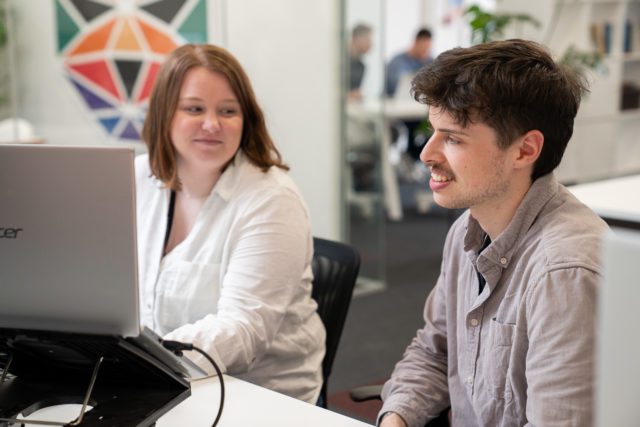If you’re new to SEO, you’ve probably come across a range of terms that sound important but you’re not quite sure what to do, how to do it or when. One such term we’ve been asked about is content audits and, specifically, when the right to do a content audit is.
The best time to do a content audit for SEO is right at the start of a new campaign. This helps you to understand the health and quality of existing content, as well as identify high-priority tasks that need addressing. It can also be a good idea to perform a content audit six to nine months into a campaign and at the end of a campaign to determine the overall success of your efforts.
Read on to learn more about when to do a content audit and the factors that should be considered as part of the audit.

There are many reasons why you might perform an SEO content audit. However, you’ll typically do them on three key occasions;
Whether you work for an agency, in-house or freelance, one of the first steps in a new SEO campaign is to run a series of audits in order to understand the current health and performance of the website. One such audit is a content audit.
Running a content audit at this time not only allows you to understand the current state of the content on a website, but also gives you a benchmark upon which you can assess ongoing performance.
It also allows you to set goals and priorities based on actual data for a more strategic campaign.
SEO is a long-term strategy so it’s unlikely that you’ll see meaningful results before the six to nine-month mark. At this point, it can be a good idea to run your audits again to see how the campaign has progressed.
This information can then be used to feed your ongoing strategy or, if things aren’t quite going as planned, to help you rethink your strategy.
If, for whatever reason, a campaign is ending, it could be beneficial to run a final audit in order to gauge success. If you’re working on behalf of a client, this information can be used to showcase your work on the campaign and the success of your strategy. It could also be used to gain further work if you provide detailed recommendations.
If you’re working in-house or for yourself, this information will help you to plan future marketing endeavours and give you an up-to-date benchmark for success.
The purpose of a content audit is to evaluate the health and current state of content on your website. It encourages you to assess its strengths, weaknesses and how well it performs against a number of key factors for SEO. Typically, a content audit looks at the content assets on your website, such as landing pages, blogs and resources.
The information gathered during a content audit helps you to understand what’s already working well and where you might need to make improvements in order to see positive changes in search rankings.
For example, an audit might highlight content that is already performing well, but might just need a boost. But, it could also highlight pages that need a complete overhaul – perhaps the wrong keywords are being used, or the content just isn’t relevant to the topic.
Depending on the level of detail that your audit goes into, you might also find yourself cataloguing content and analysing its performance using tools such as Google Analytics and Google Search Console. This would provide you with additional insights in which to create a well-informed content strategy.
Coupled with other key SEO audits such as a technical site audit and an E-E-A-T audit, you should be in a good position to create a winning SEO strategy.

So, now you know why and when you should perform a content audit. But, how do you do it? Below we go through the seven key areas that you should evaluate to help you understand how to conduct a content audit.
Thin/no content means that there isn’t enough content on the page to either;
There needs to be a substantial amount of valuable content on your website to help both real users and search engines understand what you’re offering. Having enough content means that you have the space to sell your offering, and include key SEO ranking factors.
Learn more about thin/no content in our detailed blog, What is Thin Content and Does it Hurt SEO?
Once you’ve determined whether or not you have enough content on your web pages, you then need to assess the structure of your pages. Often, you’ll find that this section of the audit results in a number of high-priority tasks that can have a big impact on SEO.
Typically, you’ll be assessing things such as:
Another key area to assess is the use of keywords. Without the proper use of carefully selected keywords, your website will struggle to rank as you’d like it to. Your content audit will allow you to understand how, or if, keywords are currently being used across your website and what changes need to be made to start seeing improvements in search rankings.
However, it’s important to remember that there is such a thing as over-stuffing keywords. This can have a negative impact on SEO and may see your rankings suffer. You can learn more about this in our detailed blog, How to Avoid Keyword Stuffing – Keyword Best Practices.
Duplicate content comes in a few different forms but is, essentially, exactly what it sounds like. In its simplest form, you’ll be checking that content isn’t duplicated across the site, any subdomains, or across the internet as a whole. This can have a negative impact on SEO as it confuses search engines; they don’t know which version of the content to rank.
When checking for duplicate content, this also extends to metadata such as title tags and H1s. Additionally, it also includes URLs, but this is more technical SEO than content SEO.
Learn more about this in our detailed article, Why is Duplicate Content Bad for SEO?
This section of a content audit will only be relevant to websites that have a blog or news section. However, in those cases, it is worth reviewing. Not only will it reveal any potential content goldmines, but it could also highlight any technical issues that you were not yet aware of.
Blogs are typically low-priority, particularly at the start of a campaign, but some of the key factors to consider when auditing blogs include;
Learn more about what constitutes a good blog for SEO in our detailed article, How Do You Optimise a Blog for SEO?
“Helpful content” is a part of Google’s content guidelines that state that content should be genuinely helpful to users and not solely created for SEO purposes. When conducting a content audit, it’s important to check that the content on the website is genuinely helpful to users and is of high quality. Google may devalue websites that they believe to break these guidelines.
E-E-A-T stands for Experience, Expertise, Authority and Trustworthiness. Whilst not necessarily a direct ranking factor, Google’s Search Quality Evaluator Guidelines use E-E-A-T to measure content quality, particularly within YMYL niches.
As such, it’s important to ensure that your website’s content highlights each of these factors. Learn more about how to write E-E-A-T content in our dedicated blog.
Learn more about what to include in your content audit in our dedicated blog, What to Include in a Content Audit, where we go into more detail about each key factor that you should assess.

If you’re not quite sure where to start when it comes to auditing your website’s content for SEO (and what to do with that information afterwards), get in touch with Wildcat Digital today. At the start of each and every campaign, our SEO experts take stock of your website, before putting together a tailored strategy. Even if you want to create your own content, we can help ensure that you’re starting off on the right foot and have a strategy in place that makes sense for your business.

Founder
Our founder, Will Hitchmough, worked at a number of high profile Sheffield Digital Agencies before founding Wildcat Digital in 2018. He brings an extensive knowledge of all things related to SEO, PPC and Paid Social, as well as an expert knowledge of digital strategy.
Digital Marketing can be a minefield for many businesses, with many agencies ready to take your money without knowing how to deliver results. I founded Wildcat Digital to deliver digital success to businesses with smaller budgets in a transparent way.

Head of Growth
Rich joined us in May 2024 to head up our growth team. With years of experience helping other agencies to grow, Rich joins us at an exciting time as Wildcat is working on a five-year plan to become one of the biggest agencies in the UK.
Outside of work, Rich is a father to three children, which keeps him very busy! He’s also recently started running again to keep fit and loves a bit of DIY.

Head of Digital
Sarah joined Wildcat in January 2025, bringing over seven years of SEO expertise to the team. With a background in Fashion Communication and Promotion, she has worked both in-house and at agencies, covering a range of digital marketing specialisms before focusing on SEO.
Passionate about all things search, Sarah thrives on helping brands grow their online presence.
Outside of work, she enjoys walking her dog, running, and shopping for vintage clothing.

Office Manager
Amelia joined Wildcat Digital in January 2025, bringing extensive experience in HR, Health & Safety, Facilities Management and IT Support. Previously an Operations Manager at The University of Sheffield, she has a strong background in creating efficient and well-organized work environments.
Specialising in HR, Health & Safety, and Facilities Management, Amelia ensures the Wildcat Digital team has the resources and support needed to thrive. Whether managing office operations, maintaining compliance, or fostering a positive workplace culture, she keeps everything running smoothly.
Outside of work, Amelia loves trying new things, traveling, camping, and walking. She also enjoys socialising and exploring new places with friends and family. Her adventurous spirit and proactive approach make her a valued member of the team.

Client Success Coordinator
Siena joined us in 2023 with a background in sales and digital marketing. She leads on client relationships across the company, ensuring that our customers are happy throughout their journey with us, from their initial consultation through to onboarding and beyond.
Outside of work, Siena enjoys travelling and getting stuck into the local culture. She likes to make the most of her experiences and particularly enjoys watching sunrises and sunsets from beautiful locations around the world.

SEO Account Director
Paul has a strong background in SEO, having previously founded and ran a successful eCommerce business, as well as running a personal blog that achieves an average of 17K users per month. Paul’s knowledge of SEO is extensive, with a strong emphasis on client handling and technical SEO.
Outside of work, Paul enjoys spending time with his family and staying active with weight lifting and combat sports.

Team Lead & Technical SEO Account Manager
With a degree in Computer Science and SEO experience dating back to 2017, Dariusz has a wide range of SEO skills and knowledge. His specialist knowledge of Technical SEO has firmly landed him the title of Wildcat’s Technical Wizard, and he has recently taken on the responsibility of Team Leader for the Panthers Team.
In his spare time, Dariusz loves hiking, experimenting and trying new coffees and loves learning new things. He is currently learning more about CRO and AI and how this could benefit our clients.

Team Lead & Senior SEO Account Manager
With a background in sales, Molly is a natural Account Manager, brilliantly handling any issues that come her way. Having joined us as a Digital Marketing Executive, and working part-time through her final year of University, Molly is a shining example of how hard work pays off. She is now an SEO Account Manager with a particular interest in Content and Client Management.
In her spare time, Molly loves to get out in nature, hiking and exploring the Peak District. She also loves cooking and likes to unwind with a bit of yoga.

PPC Team Leader
Libby joined Wildcat in 2021 as our first PPC hire. With a degree in Digital Media Production, a Master’s in Digital Media Management and previous experience in Social Media Management, Libby hit the ground running and has since climbed the ranks to Senior PPC Account Manager and has a particular interest in the eCommerce sector.
Outside of work, Libby likes gaming, and cooking and likes to keep active by lifting weights.

Senior SEO Account Manager
With a degree in Film and TV production, and a varied career history, Jamie made the move to marketing with a Masters degree in Digital Media Management. He has since worked in SEO at Agencies across Sheffield, before joining Wildcat and working his way up to SEO Account Manager. Jamie has a particular interest in backlinks and Digital PR and has recently gained a client a valuable backlink from Forbes!
In his spare time, Jamie is an avid foodie and loves trying new restaurants and cuisines. He also loves to travel and spent a year travelling to Australia after university.

SEO Account Manager
Jasmine joined Wildcat in 2022 with a strong background in SEO and Account Management. At the time, she was finishing up a Level 4 Apprenticeship in Digital Marketing from the Chartered Institute of Marketing, and has since worked her way up to SEO Account Manager. Jasmine excels at content writing and promotion, and particularly enjoys finding creative ways to join the dots on multi-channel campaigns.
In her spare time, Jasmine volunteers at a charity, helping combat loneliness & social isolation experienced by older neighbours. Outside of Wildcat, she owns a catering company, Savery Grazing, creating delicious grazing tables & platters for a range of events. She also loves skiing and exploring the Peak District.

Senior SEO Executive
After spending ten years managing businesses, restaurants, cafes and event spaces across Sheffield, Jon decided to change careers and joined Wildcat as an SEO Executive in 2022. He especially enjoys the client management side of the job, helping them to understand digital marketing and ways in which they can build their business’s presence online.
Outside of work, Jon likes to keep fit with running, badminton and football, and also loves music.

Senior SEO Executive
Andy joined Wildcat in 2023 after starting his digital marketing career in-house for a local Sheffield company. Since joining, he has developed a strong interest in Technical SEO and has strong skills in Account Management.
Outside of work, Andy loves music and plays in a couple of bands. He also enjoys rock climbing, cycling, photography and good food.

PPC Executive
Before joining Wildcat, Tom worked across different industries, building skills in sales and customer service. He later developed a passion for digital marketing whilst working on personal marketing projects and freelance ventures, and gained numerous certifications in PPC and Social Media.
Outside of work, Tom enjoys staying active by going to the gym and hiking. He also loves travelling and motorbiking.

Senior SEO Executive
Kezia joined us in July 2024 after completing a CIM Certificate in Digital Marketing and gaining experience in Content SEO at another Sheffield agency.
In her spare time, Kezia loves to get outdoors, bouldering, hiking and travelling.

Senior PPC Executive
Alex joined Wildcat Digital in December 2024 as a Senior PPC Executive, bringing a strong background in Paid Media, Paid Social, and Programmatic advertising. With a degree in Business & Marketing and Google Ads certifications, she has the expertise to craft high-performing campaigns that drive results.
Before joining Wildcat Digital, Alex worked at two leading agencies in Leeds, honing her skills across various digital advertising platforms. Her analytical mindset and strategic approach help businesses maximize their online presence and advertising budgets.
Outside of work, Alex enjoys spending time with her dog, Lola, and going on walks with her dog walking group. She’s also a keen footballer and loves playing five-a-side whenever she gets the chance. Her enthusiasm and team spirit make him a great addition to the Wildcat Digital team.

SEO Executive
Amy joined Wildcat in 2024 with a background in journalism, having worked as a News Editor and Editor-in-Chief at The Sheffield Tab. She is naturally interested in Content SEO and research, so will no doubt prove to be a content power-house.
In her spare time, Amy loves watching crime shows, listening to music and hanging out with her dog, Eddie!

SEO Executive
Reiss joined the Wildcat Digital team in July 2025, with a background in journalism and digital content, Reiss brings both creativity and technical know-how to the team.
After graduating with a Journalism Studies BA from the University of Sheffield, where he also served as Games Editor and Deputy Editor for the student-run newspaper – Reiss jumped straight into the world of climate tech communications.
Outside of work, Reiss loves crochet, swimming, playing guitar, and diving into both video and board games. He’s always up for picking up new skills and trying new things – which makes him a perfect fit for our team!

Content & Proposal Writer
Liv joined the WildcatDigital Team in June 2025, with a strong background in financial admin and client care, Olivia is taking an exciting step into the creative world – and we’re so glad she’s doing it with us!
She’s currently studying content creation through her apprenticeship with Wildcat, and already bringing fresh energy and creativity to the team.
Outside of work, Olivia runs her own BIAB nail business, loves reformer Pilates, long walks, and is a member of a competitive dance team.

January 26, 2026
We made it to the end of January! One month into 2026, and it feels like a lot has changed.…

January 23, 2026
Many businesses assume that Author and Meet the Team pages are simply a nice way to showcase the people behind…

December 17, 2025
As we enter into 2026 and reflect back on the year as business owners and digital marketers, we can’t help…